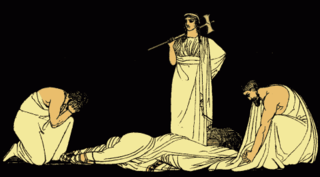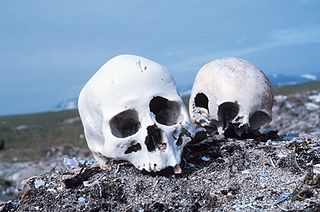
In ordinary language, a crime is an unlawful act punishable by a state or other authority. The term "crime" does not, in modern criminal law, have any simple and universally accepted definition, though statutory definitions have been provided for certain purposes. The most popular view is that crime is a category created by law; in other words, something is a crime if declared as such by the relevant and applicable law. One proposed definition is that a crime or offence is an act harmful not only to some individual but also to a community, society or the state. Such acts are forbidden and punishable by law.
Genocide is intentional action to destroy a group of people in whole or in part. The hybrid word "genocide" is a combination of the Greek word γένος and the Latin suffix -caedo. The term genocide was coined by Raphael Lemkin in his 1944 book Axis Rule in Occupied Europe;

Murder is the unlawful killing of another human without justification or valid excuse, especially the unlawful killing of another human with malice aforethought. This state of mind may, depending upon the jurisdiction, distinguish murder from other forms of unlawful homicide, such as manslaughter. Manslaughter is a killing committed in the absence of malice, brought about by reasonable provocation, or diminished capacity. Involuntary manslaughter, where it is recognized, is a killing that lacks all but the most attenuated guilty intent, recklessness.

The Nuremberg trials were a series of military tribunals held after World War II by the Allied forces under international law and the laws of war. The trials were most notable for the prosecution of prominent members of the political, military, judicial, and economic leadership of Nazi Germany, who planned, carried out, or otherwise participated in the Holocaust and other war crimes. The trials were held in Nuremberg, Germany, and their decisions marked a turning point between classical and contemporary international law.

The police are a constituted body of persons empowered by a state to enforce the law, to protect the lives, liberty and possessions of citizens, and to prevent crime and civil disorder. Their powers include the power of arrest and the legitimized use of force. The term is most commonly associated with the police forces of a sovereign state that are authorized to exercise the police power of that state within a defined legal or territorial area of responsibility. Police forces are often defined as being separate from the military and other organizations involved in the defense of the state against foreign aggressors; however, gendarmerie are military units charged with civil policing. Police forces are usually public sector services, funded through taxes.
Historical negationism, or denialism, is an illegitimate distortion of the historical record. It is often imprecisely or intentionally incorrectly referred to as historical revisionism, but that term also denotes a legitimate academic pursuit of re-interpretation of the historical record and questioning the accepted views.

In law, treason is criminal disloyalty to the state. It is a crime that covers some of the more extreme acts against one's nation or sovereign. This usually includes things such as participating in a war against one's native country, attempting to overthrow its government, spying on its military, its diplomats, or its secret services for a hostile and foreign power, or attempting to kill its head of state. A person who commits treason is known in law as a traitor.

Forensic science is the application of science to criminal and civil laws, mainly—on the criminal side—during criminal investigation, as governed by the legal standards of admissible evidence and criminal procedure.

Crimes against humanity are certain acts that are deliberately committed as part of a widespread or systematic attack directed against any civilian or an identifiable part of a civilian population. The first prosecution for crimes against humanity took place at the Nuremberg trials. Crimes against humanity have since been prosecuted by other international courts as well as in domestic prosecutions. The law of crimes against humanity has primarily developed through the evolution of customary international law. Crimes against humanity are not codified in an international convention, although there is currently an international effort to establish such a treaty, led by the Crimes Against Humanity Initiative.

Crime fiction, detective story, murder mystery, mystery novel, and police novel: These terms all describe narratives that centre on criminal acts and especially on the investigation, either by an amateur or a professional detective, of a serious crime, generally a murder. It is usually distinguished from mainstream fiction and other genres such as historical fiction or science fiction, but the boundaries are indistinct. Crime fiction has multiple sub-genres, including detective fiction, courtroom drama, hard-boiled fiction and legal thrillers. Most crime drama focuses on crime investigation and does not feature the court room. Suspense and mystery are key elements that are nearly ubiquitous to the genre.

Natzweiler-Struthof was a German-run concentration camp located in the Vosges Mountains close to the Alsatian village of Natzwiller in France, and the town of Schirmeck, about 50 km (31 m) southwest of the city of Strasbourg. Natzweiler-Struthof was the only concentration camp established by the Nazis on French territory, though there were French-run temporary camps such as the one at Drancy.
Crime Library was a website documenting major crimes, criminals, trials, forensics, and criminal profiling from books. It was founded in 1998 and was most recently owned by truTV, a cable TV network that is part of Time Warner's Turner Broadcasting System. In August 2014, Crime Library was no longer being updated. In February 2015 the site was taken offline.
Poliziotteschi constitute a subgenre of crime and action films that emerged in Italy in the late 1960s and reached the height of their popularity in the 1970s. They are also known as Italo-crime, Euro-crime, poliziesco, spaghetti crime films, or simply Italian crime films. Influenced by both 1970s French crime films and gritty 1960s and 1970s American cop films and vigilante films, poliziotteschi films were made amidst an atmosphere of socio-political turmoil in Italy and increasing Italian crime rates. The films generally featured graphic and brutal violence, organized crime, car chases, vigilantism, heists, gunfights, and corruption up to the highest levels. The protagonists were generally tough working class loners, willing to act outside a corrupt or overly bureaucratic system.
The French Connection was a scheme through which heroin was smuggled from Turkey to France and then to the United States through Canada. The operation reached its peak in the late 1960s and early 1970s, and was responsible for providing the vast majority of the heroin used in the United States. The operation was headed by Corsican criminals Paul Carbone and Antoine Guérini, and also involved Auguste Ricord, Paul Mondoloni and Salvatore Greco. Most of the operation's starting capital came from assets that Ricord had stolen during World War II when he worked for Henri Lafont, one of the heads of the Carlingue during the German occupation in World War II.

Pierre Le Grand was a French buccaneer of the 17th century. He is known to history only from one source, Alexandre Exquemelin's Buccaneers of America, and may be imaginary.
Cornelia Connelly School is a Catholic college-preparatory high school for girls in Anaheim, California. Established in 1961 by the Sisters of the Society of the Holy Child Jesus, it is named after Cornelia Connelly, founder of that Roman Catholic religious institute. Although located in the Roman Catholic Diocese of Orange, it is an independent school, one of ten Holy Child schools in the United States. There also are thirteen other Holy Child Schools in England, Ireland, France, Ghana, and Nigeria.
The American Mafia or Italian-American Mafia is a highly organized Italian-American criminal society. The organization is often referred to by members as Cosa Nostra and by the government as La Cosa Nostra (LCN). The organization's name is derived from the original Mafia or Cosa nostra, the Sicilian Mafia, and it originally emerged as an offshoot of the Sicilian Mafia; however, the organization eventually encompassed or absorbed other Italian-American gangsters and Italian-American crime groups living in the United States and Canada that are not of Sicilian origin. It is often colloquially referred to as the Italian Mafia or Italian Mob, though these terms may also apply to the separate yet related Sicilian Mafia or other organized crime groups in Italy.
The Corsican mafia is a set of criminal groups which are part of the French Mob, originating from Corsica. The Corsican mafia is an influential organized crime structure, operating in France, Russia, and many African and Latin American countries. The most important groups of the Corsican mafia include the Unione Corse and the Brise de Mer gang.
In the May 1947 crises, the Communists were excluded from government in Italy and France. The crises are commonly reckoned to be the start of the Cold War in Western Europe.

A massacre is a killing, typically of multiple victims, considered morally unacceptable, especially when perpetrated by a group of political actors against defenseless victims. The word is a loan of a French term for "butchery" or "carnage".












